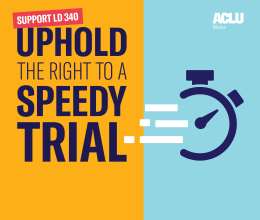Augusta – The members of the Committee on Judiciary who were present at a work session today voted 8 – 0 “ought to pass as amended” on LD 1421. The bail reform bill would eliminate money bail for most Class E misdemeanors and require bail commissioners and judges to consider how bail conditions would affect a defendants’ health needs, caretaking responsibilities and ability to remain employed.
“This bill is an important step to stop criminalizing poor and working-class people, and to address racial disparities in the criminal justice system,” said Rep. Rachel Talbot Ross (Portland), who sponsored the bill. “The majority of people in pre-trial detention are there simply because they cannot afford cash bail for minor offenses. People of color, especially Black people, often have much higher bail set than white people arrested for the same offense.”
The bill would eliminate money bail for most Class E misdemeanors, the least serious offenses in the Maine criminal code. These include offenses such as littering, petty theft and violating minor conditions of pretrial release, such as missing curfew.
Money bail is a primary driver of incarceration in Maine. Before the COVID response, pre-trial detainees made up between 60 and 80 percent of the jail population in every county. The majority of people in jail are deprived of their liberty, even before they have had their day in court.
“The Supreme Court has consistently said holding defendants prior to trial should be a carefully limited exception. But in Maine, pre-trial detention has become the norm for poor people. Spending even a night in jail could mean losing custody of your kids, your spot in a recovery house, or losing your job,” said Meagan Sway, policy counsel for the ACLU. “This modest bail reform bill ensures that all Mainers enjoy the presumption of innocence and due process, not just wealthy Mainers.”
If the legislature goes in for a special session, the bill will be sent to the House and Senate for votes by the full legislature.








